Lunch breakpublished at 12:58 BST 10 May 2024
The inquiry has now taken a break for lunch and will continue with further evidence from the chief medical officer at about 13:45 BST.
The UK Covid-19 Inquiry, sitting in Belfast, is scrutinising the Northern Ireland Executive's handling of the pandemic
More than 4,000 people in Northern Ireland died with Covid since the pandemic was declared in March 2020
Prof Sir Michael McBride, NI's chief medical officer, is giving evidence on Friday
The inquiry has now taken a break for lunch and will continue with further evidence from the chief medical officer at about 13:45 BST.
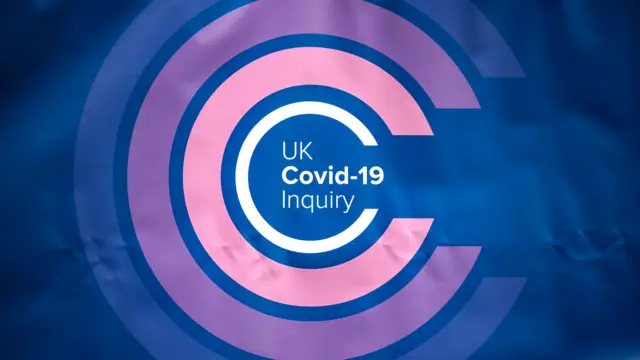 Image source, PA Media
Image source, PA MediaDr McBride is asked by Clair Dobbin KC about a letter that was sent to all Stormont departments on Covid on 6 February 2020.
In it, he lays out details about tourists travelling to Northern Ireland from Wuhan and advises they should isolate for 14 days if they display symptoms.
He then ends by saying the Department of Health was "closely monitoring" the situation and that no other action is recommended to public authorities.
Ms Dobbin says the letter's contents do not seem like alarm bells were ringing for Dr McBride.
However, he says the letter was "scene-setting" for a meeting where trusted partners would be briefed and assurances would be sought for contingency plans.
He adds the letter was not meant or intended to set out or explain the level of risk Covid brought.
Dr McBride says he has no role in clearing Executive papers and did not during the pandemic.
He was asked by the counsel to the inquiry if he can be accused of "overreach" after saying in an email from January 2020 that he wanted to "clear all future Executive papers" while health was the lead department in relation to a meeting of Cobra, the government's emergency committee.
He says he remembers clearly writing the email and he had been referring to technical matters.
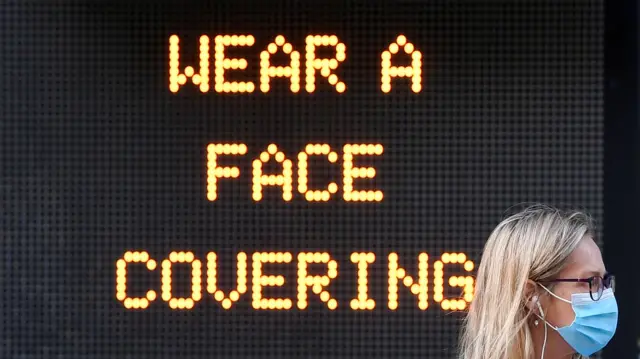 Image source, Reuters
Image source, ReutersDr McBride says there was a "high level of uncertainty" about asymptomatic transmission.
He adds Covid-19 had an 80% similarity to the viral respiratory disease Sars, but in many ways it wasn't the same virus.
He also says in the early days many did not understand the basic science, transmissibility and how infectious Covid was and that they were planning in "huge uncertainty".
He asks others to bear in mind when reflecting on the initial response to Covid that they knew so little and that planning had been based around similar coronaviruses.
NI's chief medical officer says his advice was informed by the "best scientific advice available to me".
Dr McBride talks about expert advice in terms of asymptomatic transmission and infection in the early days of the pandemic.
He says there was initially a "precautionary approach" but that "sitting and waiting was not an option".
"We had to plan and prepare for what potentially might happen. It would have been irresponsible to sit and wait to see how things pan out," he tells the inquiry.
“If you wait and waited until it actually happened it would be too late for any preparation,” he says.
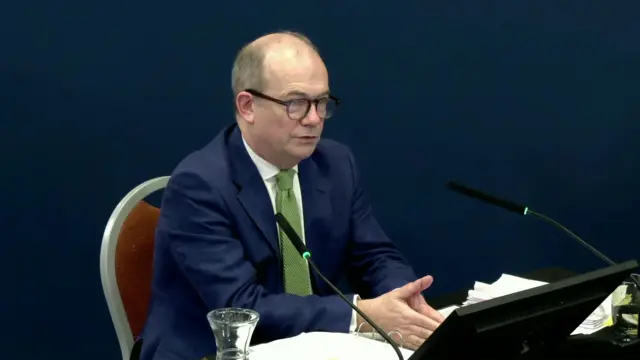
Dr McBride discusses the visit of a group of tourists from Wuhan, China, to Northern Ireland on 25 January 2020.
He says the context of a text message which described him as not being concerned about their visit was that they had been risk assessed in Scotland and testing had been carried out.
"I was satisfied with those arrangements," he says.
One of the tourists, Dr McBride continues, had seasonal flu and the others were asymptomatic.
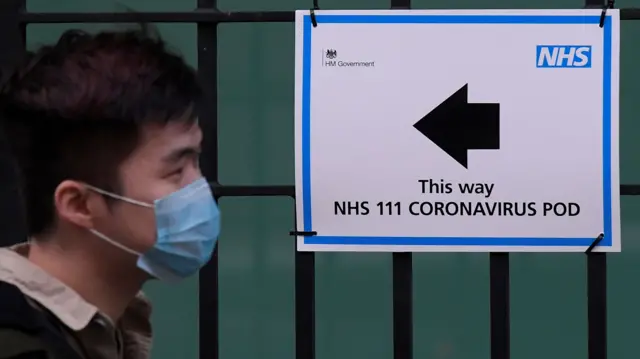 Image source, Reuters
Image source, ReutersThe inquiry continues now with Dr McBride stating he became "very concerned" about the threat of Covid after a Cobra - cabinet office briefing - meeting on 29 January 2020.
However, he says his responsibility and role was to look forward at what might happen and map the way back from there and plan for a number of different scenarios which is what happened between January and February 2020.
The inquiry has been taking a short break.
Remember, you can watch proceedings live when they resume by clicking play at the top of this page.
Dr McBride says the scale of the Covid response has never been planned for.
"We had similarly never tested to the extent we were ultimately testing in this pandemic, we had never before performed contact tracing at the scale that we were contact tracing," he adds.
"It had never been envisaged."
"The next pandemic will not be the same," Dr McBride tells the inquiry.
He adds it is "important to look back" to see what could be done differently.
He suggests such an approach should be examining the core elements of a response to a pandemic which are generic and which need to be scaled "at pace and agility" before considering scenarios of potential new pathogens which may lead to a pandemic.
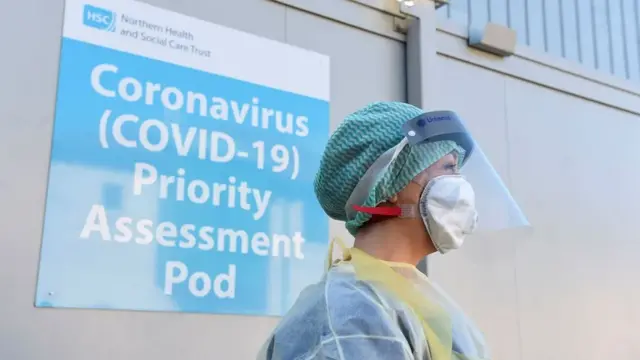 Image source, PA Media
Image source, PA Media"Northern Ireland was less resilient at the start of this pandemic than it was in 2009 with the H1N1 pandemic which by comparison did not have the same impact," Dr McBride says.
He adds: "So we headed into this pandemic with a less resilient health and social care system, budgetary uncertainty, significant workforce challenges and vacancies in the system that was overdue change."
Dr McBride gives an oversight of Northern Ireland's challenges to health.
He says there are many underpinning factors which contribute to life expectancy which are "unique" to Northern Ireland, such as economic and societal factors, which are "stubbornly difficult to address".
But, he adds, life expectancy in Northern Ireland is "broadly similar" to the rest of the UK.
Dr McBride is asked by counsel to the inquiry, Clair Dobbin KC, about Northern Ireland having many more people diagnosed with a mental health condition.
He says research points to the fact Northern Ireland is a society coming out of conflict and that anti-depressants are prescribed in much higher numbers in interface areas.
"[There is] no doubt there has been an enduring consequence of the Troubles in Northern Ireland," he adds.
It was "absolutely preferable to have a government" in Northern Ireland, Dr McBride says, adding it was "fortunate during the pandemic to have a government in place".
Northern Ireland's Executive had re-formed shortly before the first local case was reported in 2020.
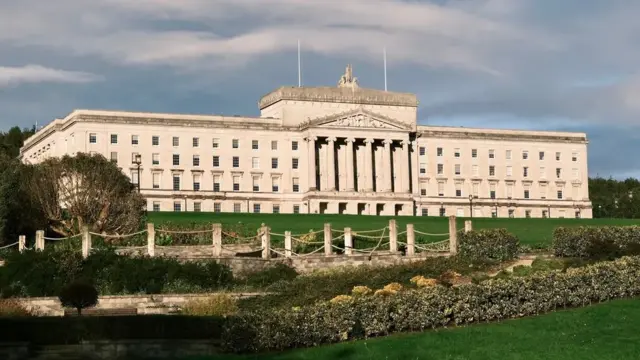
Dr McBride says the chief medical officers had regular meetings from 24 January specifically on the emerging threat of Covid.
"In terms of modelling, in those early days the problem was the absence of hard data," he explains.
Dr McBride adds they were "essentially using was reasonable worst case scenario planning from seasonal flu and using that to project the potential impact".
Dr McBride is asked about an email sent by him to the UK's chief medical officer (CMO) group, in which he thanked them for doing the "heavy-lifting".
He explains that it was a disadvantage for Northern Ireland not to have membership of the Scientific Advisory Group for Emergencies (SAGE) in the early days of the pandemic.
He adds there was "regular engagement" between the UK's CMOs from 24 January 2020.
They met three times a week and the meetings would focus specifically on the "emerging threat of Covid".
Throughout the pandemic, Dr McBride said there were 274 meetings that happened to discuss the science and public health advice about the pandemic.
However, he adds Northern Ireland was not initially invited to the first five SAGE meetings which discussed the pandemic.
It was only on 7 February 2020, after the fifth meeting, that Dr McBride received an invite.
Dr McBride says his role was to advise ministers and to support managing how services and policies are rolled out.
The inquiry then hears how this differs from his counterpart in England, whose role is more independent from government.
To what extent this dual role became “problematic” is probed by counsel to the inquiry, Clair Dobbin.
Dr McBride replies that two other Northern Ireland Executive ministers, Michelle O'Neill and Edwin Poots, previously knew him as an independent voice when they were in the role of health minister.
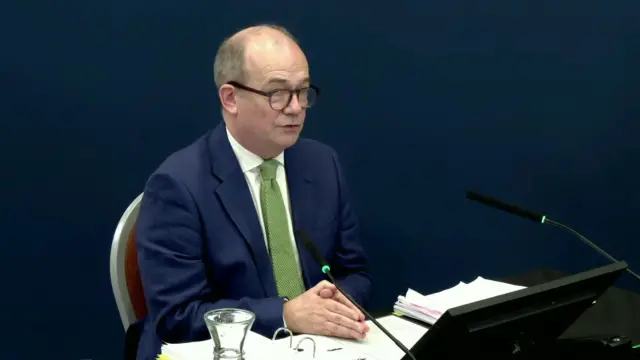
Dr McBride says he was surprised to hear there was a perception that his role during the pandemic was more than just an advisory role.
He adds throughout the pandemic he was there to advise ministers on decisions that were taken and not to make decisions.
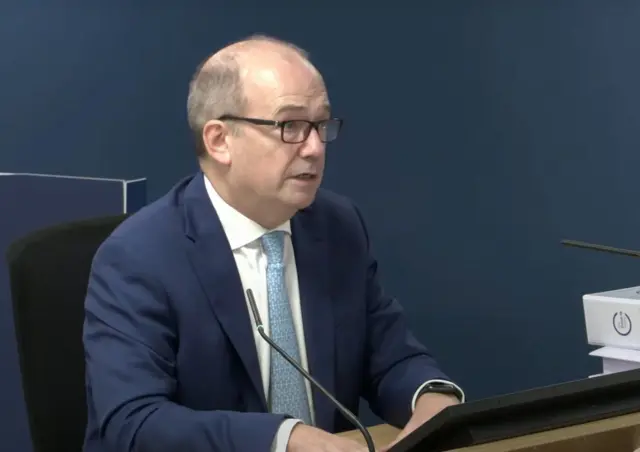 Image source, PA
Image source, PAThe inquiry hearing has started by hearing details about Dr Michael McBride's background and role.
In his opening comments, Dr McBride says he offers his advice freely and impartially to the health minister, Robin Swann.
He says he makes a clear distinction between his policy duties and his professional responsibility as chief medical officer.
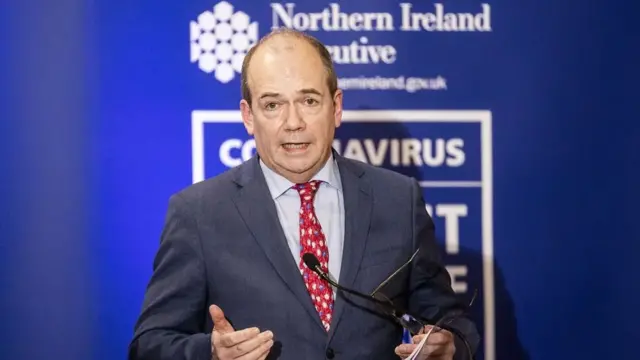 Image source, PA Media
Image source, PA MediaDr McBride has been Northern Ireland’s chief medical officer (CMO) since 2006.
He previously worked as a consultant and, in 2002, became medical director at the Royal Group of Hospitals.
As well as being the CMO, he was also chief executive of the Belfast Health and Social Care Trust for a period.
Dr McBride was a high-profile figure in Northern Ireland during the Covid-19 pandemic, often appearing alongside Health Minister Robin Swann at media briefings on the virus and lockdown restrictions.
He received a knighthood in the 2021 birthday honours list.
Northern Ireland's chief medical officer has now begun speaking at the Covid Inquiry - you can watch live by hitting the play button above.